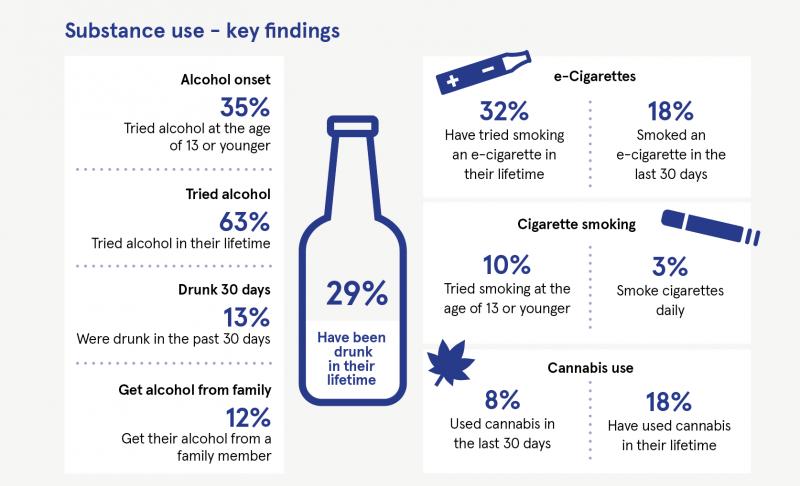Dillon, Lucy (2023) Planet Youth in Fingal, Cavan, and Monaghan. Drugnet Ireland, Issue 84, Winter 2023, pp. 33-34.
| Preview | Title | Contact |
|---|---|---|
|
PDF (Drugnet 84)
1MB |
The Planet Youth programme is being implemented in an increasing number of regions in Ireland. There are currently six Planet Youth sites at various stages of implementation: Galway, Mayo, Roscommon, Fingal, Cavan, and Monaghan. Since the start of 2022, the three latter regions have published reports from their first waves of survey data.1,2,3 The reports present an overview of baseline data on health and wellbeing indicators as well as associated risk and protective factors.
Planet Youth
As outlined previously in Drugnet Ireland, Planet Youth aims to prevent drug use among young people.4 It takes a universal approach to prevention and targets the whole population of young people in a community, rather than as individuals or groups. Developed in Iceland, Planet Youth is grounded in evidence-based practice; a community-based approach; and creating and maintaining a dialogue among research, policy, and practice.5 There are three key components to the programme: data collection and analysis that map out the nature of the risk and protective factors facing young people; implementing prevention activities through a wide range of stakeholders to increase protective factors and reduce the risk factors; and reflection and learning. The reports published in 2022 deal with the first component.
Coverage
The surveys in Fingal, Cavan, and Monaghan were carried out in Q4 of 2021. In Fingal, 2,677 young people completed the survey, while 882 did so in Cavan, and 845 in Monaghan. The young people were situated in secondary schools and alternative education settings (Youthreach) and were aged 15/16 years. Data were collected through the standard Planet Youth questionnaire, which includes 78 primary questions on health and wellbeing indicators. The findings from the surveys will be used to plan interventions to improve outcomes for young people living in these regions.
Reports
The published reports provide an overview of key findings and represent the first step in the development of a wider programme of prevention in the regions. As outlined in the Fingal report, the intention is that the North Dublin Regional Drug and Alcohol Task Force and other stakeholders will examine the dataset in more detail, using the findings to gain a better understanding of the challenges facing young people in the region.1 They will then collaborate to develop appropriate responses.
Each report presents a set of key findings for the relevant region. While the reports from Cavan and Monaghan present the same analysis of a core set of indicators, Fingal chose to analyse different responses for its report. Examples of findings include:
- Across the three regions, young people tended to have positive attitudes towards their relationships with their parents and teachers, which was seen as an encouraging protective factor. In the Fingal report, authors identify parents and teachers as ‘important community allies to support improved outcomes’ (p. 7).1
- Parents and carers feature heavily as the source of alcohol for young people across all regions. All of the reports recommend that parents and carers do not provide their young people with alcohol.
- In Cavan and Monaghan, it was found that teenagers that report high levels of unsupervised leisure time regularly are six times more likely to use cannabis.
- In Fingal, vaping was identified as a specific risk behaviour – 32% had a lifetime use, while 18% used in the last 30 days. Lifetime use of nitrous oxide was also identified (6%), although it was associated with specific social events rather than regular usage.
- In Fingal, it appeared that attitudes and perceptions of risk impact on levels of substance use. Where there was a lower perception of risk or harm, there appeared to be a correlating increase in consumption levels. It was recommended that existing partners and initiatives, who were well-placed, should strengthen health promotion initiatives that target parental, youth, and community perceptions of harm in the region.
Finally, across the three regions, it was recognised that further analysis of the data
will be warranted to inform responses that meet the needs of young people and reduce their drug use.

The Fingal report summarised its key findings on substance use in the following infographic (p. 18).1
- North Dublin Regional Drug and Alcohol Task Force (2022) ‘Improving health outcomes by understanding the lived experiences of young people in North Dublin’: North Dublin risk and protective factors Planet Youth report 1. [Fingal report]. Dublin: Merlin Press. https://www.drugsandalcohol.ie/36972/
- Planet Youth (2022) Growing up in Monaghan. Monaghan: Planet Youth. https://www.drugsandalcohol.ie/36707/
- Planet Youth (2022) Growing up in Cavan. Monaghan: Planet Youth. https://www.drugsandalcohol.ie/36706/
- Dillon L (2020) Strategy and intervention framework for Planet Youth. Drugnet Ireland, 74 (Summer): 21–23. https://www.drugsandalcohol.ie/32737/
- Sigfúsdóttir ID, Thorlindsson T, Kristjánsson AL, Roe KM and Allegrante JP (2009) Substance use prevention for adolescents: the Icelandic Model. Health Promot Int, 24(1): 16–25. http://www.drugsandalcohol.ie/28656/
A Substance use and dependence > Prevalence > Substance use behaviour > Alcohol consumption
B Substances > Cannabis / Marijuana
B Substances > Alcohol
B Substances > Tobacco (cigarette smoking)
B Substances > Tobacco (cigarette smoking) > Nicotine product (e-cigarette / vaping / heated)
T Demographic characteristics > Adolescent / youth (teenager / young person)
VA Geographic area > Europe > Ireland > Cavan
VA Geographic area > Europe > Ireland > Monaghan
VA Geographic area > Europe > Ireland > Dublin
Repository Staff Only: item control page